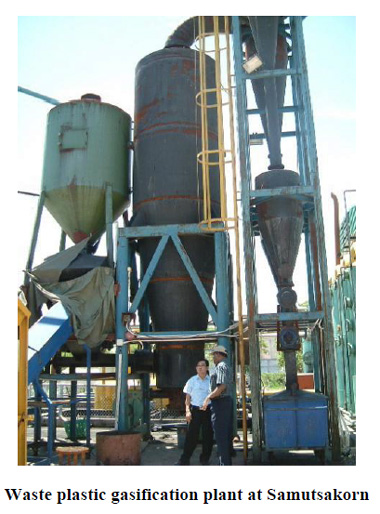Report on THE STATUS OF BIOMASS GASIFICATION in Thailand and Cambodia
October 2010 (5MB pdf linked to the owner's web site).
by P. Abdul Salam, S. Kumar and Manjula Siriwardhana
Prepared for:
Energy Environment Partnership (EEP), Mekong Region
excerpts from the report:
In Thailand, "the study identified 26 gasification plants... which can be classified into two types: thermal and electrical applications. Of these, 7 are thermal gasification plants with total capacity of 5.526 MW and 19 are for electricity generation applications in Thailand.... Out of total 26 plants, the technology of 17 plants were identified as having 14 downdraft gasifiers, 2 updraft gasifiers and a bubbling fluidized bed gasifier. Rice husk and wood chip are two major fuel types while corn cob, waste plastic, charcoal and old tyre rubber are also in use."
Almost all of the gasification plants installed for electricity generation have failed, among the reasons given for their failure, a few stand out: plants were built without adequately planning for sufficient fuel supply, more skilled and motivated workers are needed to successfully operate the plants, and the plants often experienced problems with tars and lacked adequate pollution mitigating technologies.
Perhaps unsurprisingly, the report notes that in Thailand rice mills and other established agro industries tended to prefer combustion boilers.
In Cambodia, there are many more plants (90) and they are primarily used for rural electric power generation. "Technology for most of the plants is from Ankhur
Technologies- India and most plants are 200 kW in capacity ... Almost all the gasifiers use producer
gas and diesel in a dual fuel mode. Most of the time, used diesel engines are modified and used
for these. Producer gas replaces about 75% of the diesel usage and approximately 6kg of rice
husk replaces about 1 litre of diesel."
"The feedstocks for gasification are rice husks or corn cobs, wood chips, coconut shells, cane
sugar residues (bagasse), peanut shells, etc."
Barriers to development in Cambodia are fewer, but telling:
" Even though plants are managed to remove tar by using several gas cleaning mechanisms such as
wet scrubbers, moisture removal, course filter (rice husk), passive filters (saw dust), bag filter,
the wastewater treatment is a major concern in Cambodia." and Ash Removal is seen as a major concern.
Cambodia also needs more technical training to develop it's own skilled gasification plant workers and operators.

